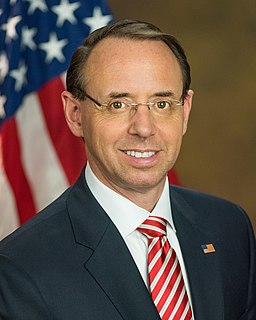A Quote by Mike Pompeo
It would not be permissible for you to build a home and not let law enforcement in if they had a search warrant. If they think there's a crime ongoing, they go to court and get a warrant, and they're permitted to come in your home under the Fourth Amendment.
Related Quotes
I think it's reasonable that the government, when it has a warrant from a court, when it's exposed to scrutiny by a legal process that would be upheld, not just nationally, but internationally as a reliable and robust standard rights protection, they can enjoy certain powers. This is no different from having the police able to get a warrant to go and search your house, to kick at your door because they think you're an arms dealer or something like that. There needs to be a process involved, it needs to be public, and it needs to be challengeable in court at all times.
If the courts regarded tweets and other social media information as private, it would not prevent the law enforcement from getting information it really needs. But the government would have to get a search warrant, which requires it to show that it has probable cause connecting what is being searched to a crime.
In the U.S., you even lose legal rights if you store your data in a company's machines instead of your own. The police need to present you with a search warrant to get your data from you; but if they are stored in a company's server, the police can get it without showing you anything. They may not even have to give the company a search warrant.
Donald Trump said that every undocumented person would be subject to deportation. Now, here's what that means. It means you would have to have a massive law enforcement presence, where law enforcement officers would be going school to school, home to home, business to business, rounding up people who are undocumented. And we would then have to put them on trains, on buses to get them out of America.
Let's say tomorrow that there was a president, that we elected a president that eliminated the bulk collection of data. Let's just say it happened. What do you think would happen? People are like 'the sky would fall. We would be overrun with jihadists.' Maybe we could rely on the Constitution. Maybe we could get warrants. ... If you make the warrant specific, there's no limit to what you can get through a warrant.
In 1979, the Supreme Court ruled 5-3 in Smith v. Maryland that a few days' worth of phone records for a single individual were not protected by the Fourth Amendment. The NSA today, though, collects hundreds of millions of phone records from hundreds of millions of Americans without an individualized warrant.
We need to statutize what is permissible and what is not permissible. If a law enforcement agent uses a clearly unapproved technique like the knee that was on the neck of George Floyd for over eight minutes, no law enforcement agent thinks that that's right and that officer should be held accountable.
While the machinery of law enforcement and indeed the nature of crime itself have changed dramatically since the Fourth Amendment became part of the Nation's fundamental law in 1791, what the Framers understood then remains true today - that the task of combating crime and convicting the guilty will in every era seem of such critical and pressing concern that we may be lured by the temptations of expediency into forsaking our commitment to protecting individual liberty and privacy.
You can't go home and look at your plaques at the end of the day, because every politician has like a million plaques on their wall. OK? You don't go home and look at - you don't get anything for that. And you can't go home and say, boy, I really served the Democratic Party or the Republican Party. You want to go home and, you know, Fourth of July, you know, any of these special holidays that recognize our country, you want to feel like you've built a stronger nation, which means you helped build the people and put them in a stronger place where everyone's lifted.






























